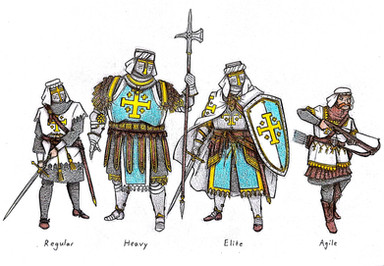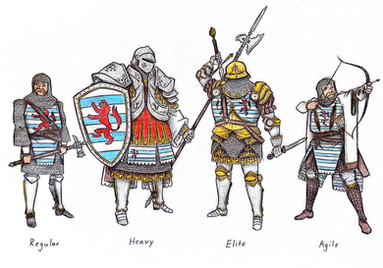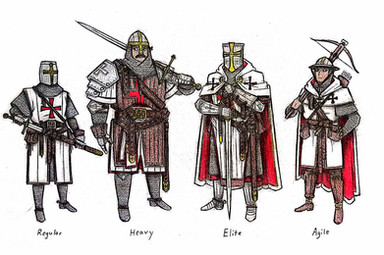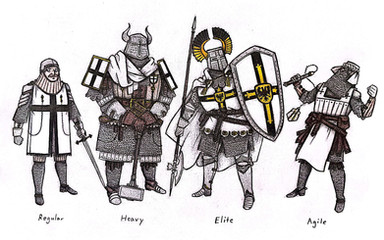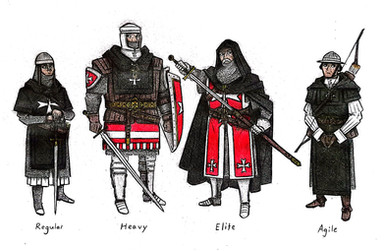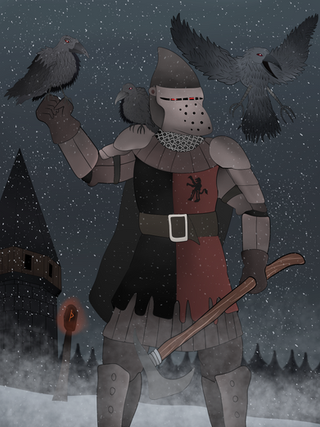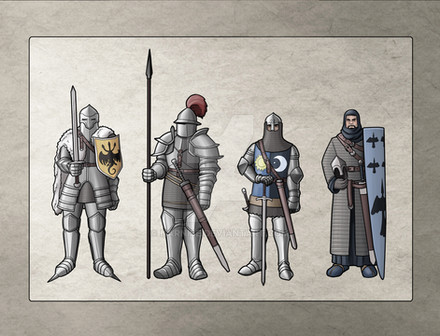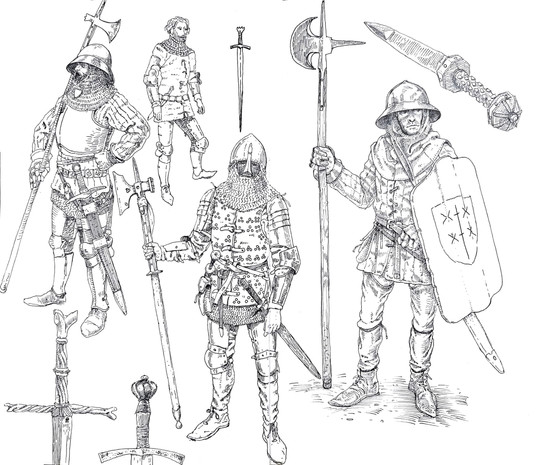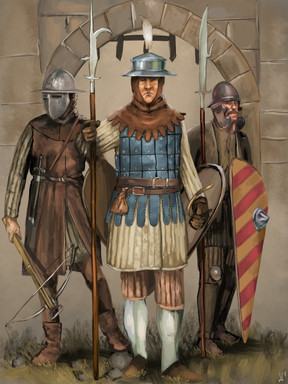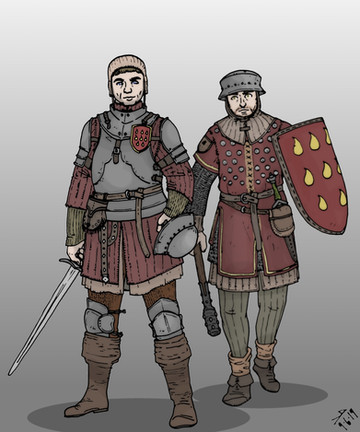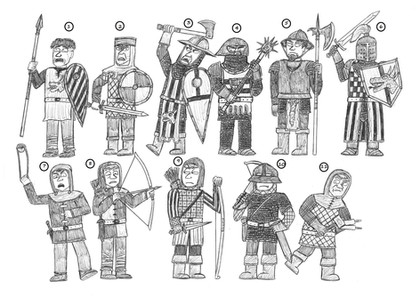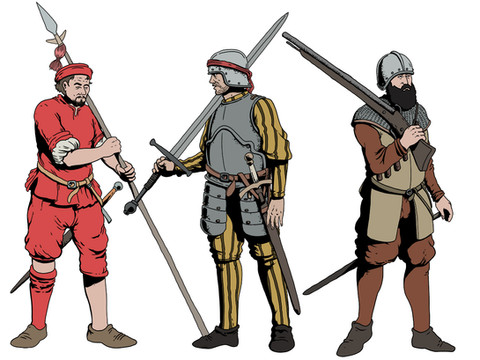HOME | DD
 Avapithecus — Capetian Knights
Avapithecus — Capetian Knights

#character #crusades #design #french #knights #medieval #referencesheet #capetian #hundredyearswar
Published: 2023-10-24 19:10:39 +0000 UTC; Views: 10585; Favourites: 131; Downloads: 0
Redirect to original
Description
I'm going to cheat just a little bit here by using the term "Capetian" as a byword for "medieval Frenchmen". For reasons I'll get into later, this is more of a creative decision than an accurate one. I'll be delving into the early history of the House of Valois in this blurb, which technically is still "Capetian" given that they're a cadet branch of the House of Capet, but usually the branch that went extinct just before the Hundred Years' War is considered the "proper" House of Capet, as it were. It's just easier to call a drawing for French soldiers from the High Middle Ages "Capetian" as a single category since I really couldn't find enough distinguishing features to justify making two distinct faction sheets for your average French Crusaders and your average Longbow targets. Okay, housecleaning out of the way. We good? Good. Let's talk history.We'll start today's story the way that most episodes of French history do: with the death of a king. Up to this point, the Kingdom of West Francia had been tenuously ruled by the Carolingian Dynasty, named of course for the famed Emperor Charlemagne. The throne was left vacant, however, when King Louis V (the last legitimate male line descendant of the Carolingian Dynasty) kicked the bucket in 987. By this point, there had been a man pulling the strings of Frankish politics for quite a while. Hugh Capet, Count of Paris, was a duke of the Robertian Dynasty, the Carolingians' primary rivals, but he was also a descendant of the Ottonian Dynasty which ruled the Holy Roman Empire. This glowing pedigree, combined with a healthy sprinkle of support from the Archbishop of Reims, won Hugh Capet the election to the throne following the death of Louis. The Carolingians were thus thoroughly replaced by this shiny new Capetian Dynasty, whose descendant branches would continue to rule France for as long as nothing bad ever happens to the French monarchy. That couldn't possibly happen, right guys?
Of course, having a dynasty that lasts that long comes at the price of slogging through vast swathes of incredibly boring kings whose biggest impact on history was bumping up the regnal numbers of more famous men. The reigns of Hugh's next few descendants are so full of the most generic-ass dynastic politics and mad lib names that my eyes glaze over and I remember why I never got that into the medieval period. The story starts to get interesting again during the reign of King Louis VII, who after failing to supply his wife Eleanor with a male heir for fourteen years, agreed to have their marriage annulled in 1152. This freed Eleanor to shack up with Henry, the Duke of Normandy, who added "King of England" to his resume in 1154. Henry's territories stretched all the way from Scotland to the Mediterranean (a state often dubbed the "Angevin Empire" by historians), and was inarguably the biggest threat to Louis's power in the region. Henry's house of cards wobbled on 1173 when his son and chosen successor, Henry the Young King, decided he was sick of waiting to snatch that crown out of his father's cold dead hands. Forming his own little Avengers team with his brothers, Richard and Geoffroy, their mother Eleanor, and her ex-husband King Louis, the Young King launched a swathe of attacks against his father… and somehow every single competitor got their asses kicked. The brothers were spanked, Eleanor was imprisoned, and Louis ultimately died in 1180.
Louis was succeeded by his son Philip II, better known as "Philip Augustus" because of his obsession with reclaiming supremacy in French territory. In fact, in 1190, he would become the first king to style himself "King of France" instead of "King of the Franks", a pedantic but important distinction. Before this, though, he stuck it to the Angevins by supporting Richard's own rebellion in 1189. This one actually succeeded in winning Richard "the Lionheart" the throne of England, beginning the long complicated frenemiship between him and Philip. They celebrated by heading the Third Crusade together, but after they lifted the Siege of Acre in 1191, Philip's dysentery and inability to cope with Richard's demanding personality led to the decision to return to France. This of course put him right next door to all of Richard's conveniently unguarded territory, and the Crusader bro code was pretty much the only thing stopping Philip from just steamrolling over Richard's lands once he got home. Richard finally concluded that business in 1192, though, and to make things even better, had been captured and imprisoned in Austria on his way home. Philip saw his golden opportunity, and actually even bribed the Emperor to extend Richard's imprisonment. Hilarious as this is, the offer was declined, Richard was released in 1194, and the two just sort of hashed it out until Richard kicked the bucket in 1199. Richard's successor John was a bit of a knob, and Philip spent the rest of his reign reconsolidating all that delicious French territory.
Philip died in 1223, and was succeeded by his son Louis VIII. Louis had already made a name for himself participating in the Albigensian Crusade. This was a slaughterfest centered on Southern France from 1209 to 1229, an inquisitorial effort to exterminate adherents of the Cathar church. The Cathars were a strange sort of Gnostic counter-church who… may or may not even existed at all as an actual political entity, but were nonetheless seen as a real threat in need of extermination by the Catholic Church. The Cathars were tried for heresy, butchered, tortured for confessions, and all those other fun overreactions against people just minding their own business which crusades and inquisitions are well known for. This Crusader zeal was inherited by Louis's son and successor, Louis IX. This Louis led the Seventh Crusade in 1248, hoping to amend the loss of Jerusalem to the Khwarazmians back in 1244. This Crusade utterly bombed, however, as the Crusaders were pushed back by the Mamluks at Mansurah in 1250, and Louis was taken as a prisoner of war shortly thereafter. He later launched the Eighth Crusade in Tunisia in 1270, but this went out with a pitiful weaze as Louis died of dysentery before he could really throw down. Despite this, he was canonized as a Saint by the Catholic Church, I guess as a sort of participation trophy, and centuries later a town in Missouri was named after him. I suppose there are worse circles of Hell.
Clearly having to make up for all this godliness in his ancestry, we skip ahead to King Philip IV, who is arguably one of the few men in history to accumulate not just zero, but negative fucks to give. In 1303, to resolve the beef he had with Pope Boniface VIII, Philip did the only logical thing and sent some thugs to beat the shit out of the Pope to the point where His Holiness died a month later. He was succeeded by Pope Benedict XI, who mysteriously died not even a year later when Philip was like "ah nah this won't do either". Taking matters into his own hands, he twisted some arms to get his buddy elected as Clement V, who couldn't even be bothered to leave for Rome. Negative Fucks Philip decided this was just fine by him and just straight up moved the seat of the papacy to Avignon in 1309, where it would remain until 1377. With that matter thoroughly settled, Philip turned around and got to work dusting off his other two inconveniences. He had expelled all the Jews from his kingdom in 1306, because… well because they were Jewish and the Jewish people can never catch a break anywhere at any time. Then, in 1307, he rounded up all those Knights Templar who had this pesky habit of having more money than him. To amend this, he had them all tried for heresy and burnt at the stake in 1314. Their last Grand Master, Jacques de Molay, supposedly used his dying breath to curse Philip and his entire bloodline. I can only presume Philip responded to this by pulling out a fat hoagie and lighting it up on the pyre flames.
Philip died later that year, nonetheless, and the throne bounced between his sons until Charles IV died without a male heir in 1328. The throne thus passed to his distant cousin, Philip VI of the House of Valois (which while often referred to as if it's a separate entity, is really just another branch of the larger House of Capet). By 1337, Philip had grown tired of the English kings haughtily touting the last vestiges of land they could claim in Gascony, so he ripped the bandaid off by formally confiscating the territory. Normally, this would simply be resolved by the English king kneeling before the French king and saying ohh no wait come on I'm totally still just a vassal, you don't have to do that, please daddy. England's King Edward III, however, wasn't into that, because he was the maternal grandson of Negative Fucks Philip IV, so of course he flipped the script by claiming that actually he was King of France now. After scrounging up whatever cash he could, Edward crossed into France in 1340, burnt everything that stood in his way, and thus the Hundred Years' War was kicked off alongside the eternal, unsettleable rivalry between France and England.
Given how the war lasted a hundred years (well okay, 116, but who's counting?), I'm going to vastly oversimplify pretty much every aspect of it here. The French spent most of the early days getting pockmarked by English longbowmen like the ones who mowed the lawn with them at Crécy in 1346. Philip's successor, John II was captured by the English at the Battle of Poitiers in 1356, forcing him to agree to a peace treaty in 1360, before ultimately he died a prisoner in 1364. The peace wouldn't last, and Edward's son, called Edward the Black Prince, largely took over the fighting for his aging father. The Black Prince died in 1376, however, and King Edward followed close behind the following year. John's successor, Charles V, was able to use the instability to reconquer most of the lost territory, and this would pretty much remain the status quo until 1415. English king Henry V decided France was his birthright, and marched to claim it so. The French caught him off guard and outnumbered at Agincourt, but Henry was a fearsome military genius who was more than capable of routing them, marking one of the most famous humiliations in French military history. Insert your own tasteless joke here.
Henry then captured Rouen in 1419, made an alliance with Burgundy after French King Charles VI had their duke assassinated, and by 1420, France was forced to cede control of Paris to the English. The Treaty of Troyes arranged for Henry to marry Charles' daughter, and it was agreed that their son would inherit the throne of France. Both Henry and Charles died in 1422, which according to the treaty should've meant that Henry's infant son should've been crowned king of both France and England and tied everything up in a nice little bow. Charles' son, Charles VII, disagreed with this arrangement though, so he spent his time grumbling and making potshots at the English until he got lucky. Luck seemed to elude him, however, and by 1428, the English had the important city of Orléans surrounded and under siege. It would've taken an act of God to break the impossible odds stacked up against Charles.
As it happened, luck would finally enter his court in 1429, in the form of some nutty peasant girl who claimed that God had spoken to her and commanded that she lift the siege in the name of her king. This was Joan of Arc, a seventeen-year old with zero military experience who got sent to Orléans to do as she would anyway because hey, what did Charles have to lose at this point? Somehow, miraculously, Jean lifted the siege, and went on to become one of France's most famous military heroes until she was captured by Burgundians in 1430 and burnt at the stake as a heretic in 1431. Despite being indirectly responsible for turning their poster child into a briquette, Burgundy decided that actually they wanted to become France's friend in 1435, and this was really the death knell for English sovereignty on the continent. With Burgundy's aid, France retook Normandy by 1450, leaving Gascony, a chunk of southern France, as the final holdout of English territory in the country. The Battle of Castillon in 1453 finally wiped the last little smudge of red off the map, and while no treaty was signed, this is usually considered the end of the Hundred Years' War. The defeat at Castillon came as such shocking news to Henry VI of England that he fell into a catatonic state, opening the door for his rival, the Duke of York, to start gunning for his claim to the throne. That, however, is a story for another day. I think I've already gone a bit over the line where this reference sheet would apply, and this blurb is long enough as is.
Design notes, like I said at the top, I kept going back and forth with myself on if I should count the early House of Valois as separate from the Capetian era. The armor styles between them aren't all that different, but there are minor distinctions the closer you get to the Renaissance. If I really put my mind to it, I probably could've separated them out into two sheets, but ultimately I decided it wasn't worth it. As I was drawing this, the more this decision seemed appropriate. I'd feel comfortable enough using at least some of these designs in a drawing of either the Crusades or the Hundred Years War. I think at most, I'd try to give them different helmets depending on the context if I was really pressed. The weird beak helmet is certainly more of a later development in the history of medieval armor, and I'm not looking forward to drawing their awkward shape multiple times. The classic blue and gold of the French, while very pretty, is also a finicky combo to put to paper. Maybe it's just my pencils, but I find that trying to insert little details of another color into a mostly blue background is a total pain in the ass which tends to warp the paper if I get too lazy. I think I managed to keep it clean enough here, but it certainly didn't translate to a perfect scan. Probably something to revisit someday.
Related content
Comments: 6

👍: 1 ⏩: 1

👍: 0 ⏩: 0

👍: 1 ⏩: 1

👍: 0 ⏩: 0

👍: 1 ⏩: 1

👍: 0 ⏩: 0

